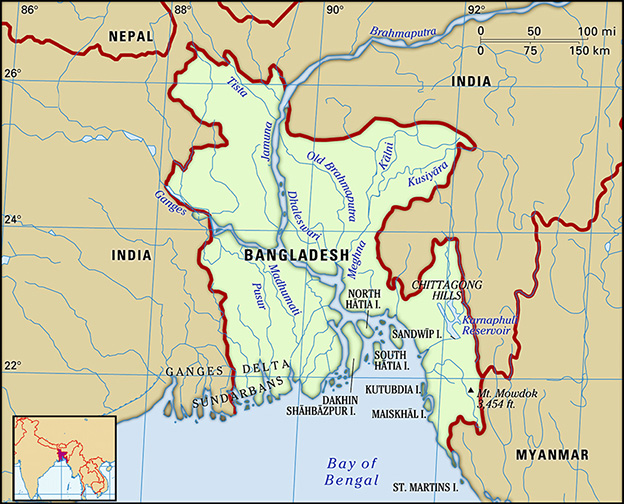International Relations
Significance of India-Bangladesh Transport Connectivity: World Bank
- 11 Mar 2021
- 5 min read
Why in News
Recently, a World Bank report named “Connecting to Thrive: Challenges and Opportunities of Transport Integration in Eastern South Asia” stated that seamless transport connectivity between India and Bangladesh has the potential to increase national income by as much as 17% in Bangladesh and 8% in India.
- The report analyzes the Bangladesh-Bhutan-India-Nepal (BBIN) Motor Vehicles Agreement (MVA).
Key Points
- Issues:
- Trade:
- Bilateral trade accounts for only about 10% of Bangladesh’s trade and a mere 1% of India’s trade.
- In East Asian and Sub-Saharan African economies, intraregional trade accounts for 50% and 22% of total trade, respectively.
- High tariffs, para-tariffs, and nontariff barriers also serve as major trade barriers. Simple average tariffs in Bangladesh and India are more than twice the world average.
- Bilateral trade accounts for only about 10% of Bangladesh’s trade and a mere 1% of India’s trade.
- Difficulty in Crossing Border:
- Weak transport integration makes the border between Bangladesh and India thick. Crossing the India–Bangladesh border at Petrapole–Benapole, the most important border post between the two countries, takes several days.
- In contrast, the time to cross borders handling similar volumes of traffic in other regions of the world, including East Africa, is less than six hours.
- Weak transport integration makes the border between Bangladesh and India thick. Crossing the India–Bangladesh border at Petrapole–Benapole, the most important border post between the two countries, takes several days.
- Isolated North-East:
- Indian trucks are not allowed to transit through Bangladesh. As a result, the northeast of India is particularly isolated with the rest of the country and connected only through the 27-km-wide Siliguri corridor, also called the “chicken’s neck”. This leads to long and costly routes.
- Trade:
- Benefits of Better Connectivity:
- Increased Real Income:
- All districts in Bangladesh would benefit from integration, with the eastern districts enjoying larger gains in real income.
- States bordering Bangladesh such as Assam, Meghalaya, Mizoram, and Tripura in the northeast, and West Bengal on the west, and states further away from Bangladesh such as Uttar Pradesh and Maharashtra would also gain huge economic benefits from seamless connectivity.
- Increased Exports:
- Will yield a 297% increase in Bangladesh’s exports to India and a 172% increase in India’s exports to Bangladesh.
- Strategic Importance:
- Geographically, Bangladesh’s location makes it a strategic gateway to India, Nepal, Bhutan, and other East Asian countries. Bangladesh can also become an economic powerhouse by improving regional trade, transit and logistics networks.
- Increased Real Income:
- Important Recommendations:
- Strengthen the MVA:
- Harmonizing driver’s licensing and visa regimes.
- Establishing an efficient regional transit regime.
- Rationalizing and digitizing trade and transport documents.
- Liberalizing the selection of trade routes.
- Improving Regional Connectivity:
- Expand the effective capacity of core transport and logistics infrastructure along regional corridors.
- Ensure competition in transport service markets.
- Deploy modern information technology infrastructure at land ports and seaports.
- Develop off-border custom clearance facilities in Bangladesh and India.
- Integration of Local Communities:
- Connecting local markets to regional corridors.
- Removing logistics bottlenecks in export-oriented value chains.
- Improving women’s participation in export-oriented agricultural value chains at the macro, community, and household levels.
- Strengthen the MVA:
Bangladesh-Bhutan-India-Nepal Motor Vehicles Agreement
- BBIN:
- The Bangladesh, Bhutan, India, Nepal (BBIN) Initiative is a sub-regional architecture of countries in Eastern South Asia, a sub-region of South Asia.
- The group meets through the official representation of member states to formulate, implement and review quadrilateral agreements across areas such as water resources management, connectivity of power, transport, and infrastructure.
- MVA
- About:
- It was signed on 15th June 2015 in Thimphu, Bhutan.
- It seeks to facilitate the unrestricted cross-border movement of cargo, passenger, and personal vehicles between BBIN countries.
- As per the agreement, member countries would allow vehicles registered in the other countries to enter their territory under certain terms and conditions. Customs and tariffs will be decided by the respective countries and these would be finalised at bilateral and trilateral forums.
- Implementation of the MVA has been delayed as the countries work to clarify some of the provisions that are supposed to be elaborated in protocols.
- Objective:
- To provide seamless people-to-people contact and enhance economic interaction by facilitating cross border movement of people and goods.
- About:







